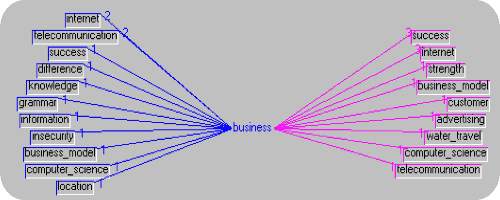Do you know your B2C customers or B2B buyers intimately on the Internet? If you don’t know your customers, you are probably not talking their semantic language online and your website is probably not being found in the search engine results either.
When it comes to online marketing, a close working relationship is a must between those that take care of your website and the products or services you provide. Simply having a website online, with just a sprinkling of your keywords throughout the site, is not good enough to getting a business found in the search engine results pages. Most of all, quality content is required, and that content better stand on its own merits. Sure, you can publish on your business website a list of things that you sell, but how is that going to hold up to the hundreds, or thousands, or even millions of websites that use those same keywords as yourself.
Think about the difficultly of reaching the right customer on the Internet. There are not an infinite amount of words in the English language. The most common words are used by everyone. With that being said though, the search algorithms have gotten much better at evaluating what a web page, and for that matter, what a website subject matter (the website theme) is all about. In the future, search algorithms will be using a form of artificial intelligence, where not only will they learn from you, but they will improve themselves with constant AI tweaking, and self learning to improve the search results.
So, how does this affect your business on the Web? What does artificial intelligence have to do with your business website, and how will artificial intelligence play out in the real world of Internet marketing in the future? The answers can be found in the actual copy writing that is on your website.
Semantic Text Analysis
 Not only are the words you use important, but the writing style, the proper grammar usage, the syntax, word capitalization, alternative word meanings, and even the titles, headings, and the included pictures can all be relevant factors in determining what the main subject is all about. Prior to the use of computers, people would read an article and be able to point out what type of writing style was being used. For example: English professors would be able to tell if a style of writing was; Argumentative – the speaker involves himself, argues, explains or analyzes in order to try to convince the interlocutor; Narrative – a narrator states a series of events, happening at a given time, and in a given place; Enunciative – the speaker and the interlocutor establish a mutual relation of influence, make their standpoints known; or Descriptive – a narrator describes, identifies or classifies something or somebody. Source: Semantic Knowledge
Not only are the words you use important, but the writing style, the proper grammar usage, the syntax, word capitalization, alternative word meanings, and even the titles, headings, and the included pictures can all be relevant factors in determining what the main subject is all about. Prior to the use of computers, people would read an article and be able to point out what type of writing style was being used. For example: English professors would be able to tell if a style of writing was; Argumentative – the speaker involves himself, argues, explains or analyzes in order to try to convince the interlocutor; Narrative – a narrator states a series of events, happening at a given time, and in a given place; Enunciative – the speaker and the interlocutor establish a mutual relation of influence, make their standpoints known; or Descriptive – a narrator describes, identifies or classifies something or somebody. Source: Semantic Knowledge
Writing analysis has much to do with the way the words are interconnected to one another. There are classes (direct relations) between using certain keywords with those of others in sentence structures. Text analysis programs take into account these keyword relationships and produce sets of references between various keyword categories, which can identify what the main subject is about. It can also be used to give an indication of the frequencies of words used and the meanings of the ambiguous words used throughout a written document in order to give a better analysis of the theme topic being discussed.
Words have different meanings depending on where and how they are being used in the body text. Also, there are times within the body text, where the same words are used as nouns in some instances, and at other times as verbs; with many times the verb noun word usage is switched even in the same document. It is said that one in four words used in a document could be deemed as ambiguous. As computer algorithms are improved, the word usage ambiguity is broken down with mathematical formulas, by evaluating all the given factors to determine with a high degree of certainty what the written document is all about.
Semantic Text Analysis Example

Business Keyword Star Graph
The Star graph above displays the relations between references, or in this case, between the “business” word category and other references. The figures shown on the graph give the number of relations (co-occurrence frequency) existing between the various references in this document. This graph shows the relations between those references. They are oriented: the references on the left of the central reference are its predecessors, those on the right are its successors. Reference Semantic Knowledge Tropes
This is a prime example of showing the relationships between the word business, and the words prior to and after business. While most of the word associations make sense from a logical perspective, however you will notice that a few of the word associations seem out of context. For example: the water_travel successor represents a usage of the words “sprinkling of your keywords” used near the top of this article. However, when this article is taken in its entirety, it is obvious that this article is not about H2O travel, but how business and the Internet have a direct success relationship together along with a host of other keyword associations.
The Semantic Web
With the aid of powerful computer programs, search engine companies can now build search algorithms that are quite smart. We generally think in terms of Search as being something we do, or a place we go online to shop, look for products and services, read the local news, or the quest for information for our business or personal use. However, Search from the standpoint of the search engines is simply a program or group of programs all designed to take and catalog the library of information online, and provide the best results possible. But, it is wise to understand the end result, in that Search is not just one particular result or even one style of results for a select search phrase. What I mean by this is, the top search engines such as Google, I believe, builds a collection of results that try to cover as broad a range of information area as possible, while keeping the results as narrow to the search terms that are practical. I’m not referring to Universal Search with the inclusion of various types of vertical search content from picture images, videos, directories, book searches, or local news data sources into one universal search output, but more as it relates to the basic search database of website results.
I’ll give you an example: Let’s say we are looking for information on how to replace the cabin filter on a 2000 Honda Accord. If you were to do a simple search query using Google Search for 2000 Honda Accord Cabin Filter, you would likely find information on the parts, prices, replacement procedures, and associated automotive areas that are directly related to the search query. While the given search query example was not placed in the form of a question like, “How to, how can, what is, or where is;” never the less, the results are given in the form of an answer by answering as broad a range of probable questions as practical, while being constrained to the topic at hand. Take a look at the results from the above search. It is interesting to note, as people become more adept at searching, they will begin to constrain their own search queries with using more sentence like structures to search and find the information they are looking for.
So, how can you apply this semantic knowledge for online marketing?
Market Segmentation
 Find a hole and fill it! You need to ask yourself some business related questions. What is missing in your particular Web market segment? What horizontal or vertical marketing information is lacking? What products or services that your business supplies, produces, or could produce need filling online? What other market segments can be penetrated?
Find a hole and fill it! You need to ask yourself some business related questions. What is missing in your particular Web market segment? What horizontal or vertical marketing information is lacking? What products or services that your business supplies, produces, or could produce need filling online? What other market segments can be penetrated?
Research and analysis is 90% of the marketing effort required. Doing due diligence, studying the competition, and keyword analysis are some of the major factors right off the bat that need to be researched, analyzed, and evaluated for the Web opportunities that are present. Then by structuring an online marketing strategy plan that can take your business’s strengths, and apply this to the business opportunities present on the Web, will help produce a sales and marketing impact success for your business. Read about strategic marketing from an Internet perspective to understand the relationships between your business, your competition, and how by including a website SWOT analysis, which includes analysis of the strengths, weaknesses, opportunities, and threats for your business online, can bring to light various marketing and advertising strategies that can be substantially applied for a sustainable competitive market edge.
The Top Ten Percent
To take advantage of your 90% effort requires the last 10% commitment. Think of it this way, you’ve done the research, you’ve identified the hole to be filled, you know what information is missing; now go do it. That might be easier said than done. Someone, either yourself or others, needs to take the next step and write the information down. Then, the information needs to get published online either in the form of a web page or pages of a website, or even in the form of a blog. The more proficient and succinct your copy writing is; using the best grammar that you can muster, taking into account the style of writing that is missing in the search engine results pages, the more likely you will be successful in your Web marketing strategy. Be aware, online marketing success is an ongoing process; it doesn’t happen overnight. Simply writing one or two articles in your particular field is probably not going to get you in the top ten percent of the search results, unless very few others have written and published about the same topical information.
Reaching Your Customers and Buyers Online Marketing Tip
Here’s an important marketing tip to remember when getting intimate with Web prospects. Reaching your customers and buyers online requires you to talk their language. When writing articles for your BtoB or BtoC business, in which you are planning for it to be used as promotional pieces to target potential customers; what good is it if you habitually only use keywords in your articles that are never searched for on the Web? Sure, you can use your own keywords or trademark phrases, but those trademark phrases also better include references to keywords used online by perspective Web customers. If there is a customer information barrier present between the way you talk and the way your customers talk, you are more than likely missing the sales and marketing boat. If there are synonyms for the various keyword terms, it is wise to also include these synonyms where appropriate, in the article too.
Natural Language Writing
KISS your prospective customers and buyers now! For those that don’t know the KISS principle (acronym for “Keep It Simple, Stupid”) states that design simplicity should be a key goal and unnecessary complexity avoided. It serves as a useful principle in a wide array of disciplines, such as software development, animation, engineering, strategic planning, Internet marketing, and online advertising. Read more about the KISS principle at Wikipedia.
Set Your Business Apart
Be different. Do it to the best of your abilities; learn, improve, and perform to a level of excellence that sets your brand apart online. Remember, everything is linked together on the Web. Your sales, marketing, advertising, and branding architectures are all inner related to each other through the information architecture(s) of the website(s). Read about marketing strategies for your B2B or B2C business. Don’t settle for mediocrity for your company. Start making a difference for your business and your future customers. Professional Web Services, can help set your business apart on the Internet. Contact us now for the business solution, to help you reach new prospects today while turning those new prospects and sales leads into customers tomorrow. I invite you to take the next step now into gaining more sales for your business. I guarantee you won’t be disappointed. Ask for your free Internet marketing SEO website evaluation today.
Now is the time to get your business discovered online. Contact Professional Web Services today.

